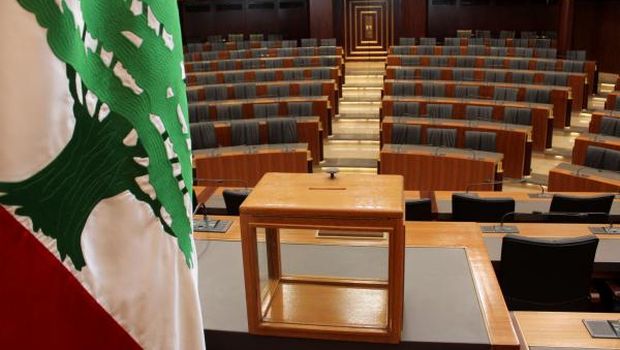
A ballot box sits on a table next to the national flag at the Lebanese Parliament in the capital Beirut on April 22, 2014 ahead of the country’s presidential election. (AFP Photo/STR)
Beirut, AP—Lebanese lawmakers affiliated with a Hezbollah-led alliance boycotted a third round of voting in parliament on Wednesday, once again foiling an attempt to elect the country’s new president.
It was the third time in less than a month that Lebanon’s legislators failed to elect a president—making it increasingly unlikely the nation’s feuding politicians will be able to choose a candidate for the country’s top Christian post before President Michel Suleiman’s term expires on May 25.
Lebanon is deeply split along sectarian and ideological lines and divisions have worsened because of the civil war raging next door in Syria. Lawmakers have been unable to agree on a compromise candidate for the presidency.
The Shi’a Muslim Hezbollah group and its allies have boycotted the voting, insisting that politicians agree on a consensus candidate to be elected ahead of time. Failure to agree on a consensus president could make things harder for the government at a crucial time while it struggles with sectarian violence and an influx of over a million Syrian refugees.
The group’s opponents have accused it of obstructing the democratic process.
The Lebanese are split in two camps, one supportive of Syrian President Bashar Al-Assad and the other supportive of the rebels fighting to oust him.
According to Lebanon’s sectarian-based power-sharing system, the president must be a Maronite Christian, the prime minister a Sunni Muslim and the parliament speaker a Shi’ite Muslim.
A two-thirds quorum of the legislature’s 128 members is required for an electoral session. Wednesday’s vote could not be held as dozens of lawmakers, many of them allied with Hezbollah, did not show up. Only 73 lawmakers attended the session.
With no quorum, Parliament Speaker Nabih Berri adjourned the session and scheduled a fourth round for May 15.
Lebanese elections are traditionally influenced by international and regional actors and presidents get elected only after securing the necessary consensus among Lebanon’s perpetually feuding politicians.
